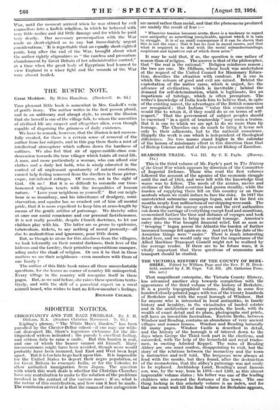SHORTER NOTICES.
CHRISTIANITY AND THE RACE PROBLEM. By J. H. Oldham, M.A. (Student Christian Movement. 7s. 6d.)
Kipling's phrase,. " The White Man's Burden," has been parodied by the Chester-Bella school—if one may use with- out disrespect Mr. Shaw's ingenious nickname for the dis- tinguished writers indicated ; the parody is excellent fooling, and seldom fails to raise a smile. But this burden is real, and one of which the bearer cannot rid himself. Many inconveniences might have been avoided, though more would probably have been incurred, had East and West been kept* apart. But it is too late to go back upon this. It is impossible for the United States to deport _their negro population, or for Great Britain to evacuate India, or for -the Colonies to- allow unlimited immigration from Japan. The question with which this work deals is whether the Christian Churches have any contribution to make to the solution of the problems involved in the contact of the various races ; if so, what is the nature of this contribution, and how can it best be made. The conclusion arrived at is that the causes of race antagonism
are moral rather than racial, and that the-phenomena produced are mainly the result of fear :-
" Wherever tension becomes acute, there is & tendency to regard i race antipathy as something inexplicable, against which it is vain to. struggle. It is of no small consequence if it can be shown that this is not the case ; that it has its root in moral causes,, and that what is required is to deal with the social misunderstandings, suspicions and injustices out of which, these arise."
It may be said that, if so, the question is one rather of reason than of.religion. The answer, is that of the philosopher, that " the real is the rational." Religion reinforces reason ; the two are one. Mr. Oldham, whose book was undertaken at the request of the United Council for Missionary Educa- tion, describes the situation with candour. It is one in which the colours of good and evil are mixed. Behind the exploitation of the native races, which -is unjust,- lies the advance of civilization, which is inevitable ; behind the demand for self-determination, which is legitimate, lies an impatience of tutelage, which is often premature. The writer's knowledge of India leads him to believe that, in spite of the existing unrest, the advantages of the British connexion are recognized ; that Indians " value this connexion and would like to retain it, if they could do so on terms of self- respect." That the government of subject peoples should be exercised " in a spirit of trusteeship " may seem a truism. But it is one to which we are apt to do no more than lip homage. The Churches can do much to bring it home not only to their adherents, but to the national conscience. Happily the work is one which is independent of theological differences. No two names stand higher in the calendar of the heroes of missionary effort in this direction than that of Bishop Colenso and that of the present Bishop of Zanzibar.


































 Previous page
Previous page